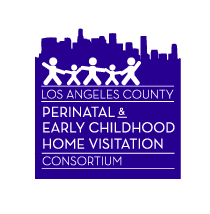California Legislative Update: Strengthening Support for Families, Children, and Home Visiting
Every year, the Los Angeles County Perinatal and Early Childhood Home Visitation Consortium tracks legislation at the federal, state, and local levels that impacts home visiting, early childhood services, and family well-being. These efforts help our network stay informed, advocate effectively, and understand how policy changes influence the families we serve.
The 2024–2025 California legislative session wrapped up last month and several of the bills that were signed into law expand access to care, strengthen family supports, and promote safer, healthier communities. Below are highlights of the California state bills the Consortium tracked this year.
Protecting Children and Families
AB 49 – California Safe Haven Schools & Child Care Act
Protects children and families by prohibiting immigration enforcement at schools and child-care sites without a warrant or authorization, ensuring safe, trusted spaces for learning and care.AB 495 – Family Preparedness Plan Act
Safeguards children during emergencies by helping parents designate trusted caregivers and maintain access to healthcare and schooling in the event of family separation.AB 1261 – Legal Counsel for Unaccompanied Immigrant Youth
Guarantees state-funded legal representation for unaccompanied immigrant youth in immigration proceedings, offering stability and protection for vulnerable minors.
Expanding Maternal and Infant Health Access
AB 55 – Alternative Birth Centers; Licensing & Medi-Cal Reimbursement
Expands maternity care options by licensing alternative birth centers and ensuring Medi-Cal reimbursement to improve perinatal access and outcomes.AB 836 – Midwifery Workforce Training Act
Creates new training pathways for nurse-midwives to address maternal care shortages, particularly in rural and underserved areas.SB 520 – Nurse-Midwifery Education Program
Establishes a statewide midwifery education program to strengthen the maternal health workforce and expand equitable access to quality care.SB 669 – Rural Hospitals: Standby Perinatal Services
Ensures rural hospitals maintain perinatal services so mothers and newborns can access critical care close to home.SB 646 – Prenatal Multivitamin Safety and Transparency
Improves prenatal health product safety by requiring manufacturers to test for heavy metals and make results publicly available.
Supporting Families and Caregivers
AB 607 – CalWORKs Home Visiting Program Extension
Extends participation in the CalWORKs Home Visiting Program to align with model requirements and allows families to continue services for up to 12 months after exiting CalWORKs.SB 590 – Paid Family Leave: Designated Person Expansion
Broadens Paid Family Leave eligibility to include care for a “designated person,” recognizing diverse caregiving relationships and strengthening family support systems.SB 792 – Child Care Subsidy Eligibility Expansion
Expands income eligibility for subsidized childcare and ensures families maintain care during temporary absences or medical needs, promoting stability and access.AB 753 – Child Care Facility Licensing and Teacher Requirements
Streamlines licensing and gives associate teachers more time to complete coursework, helping expand the early childhood workforce and childcare availability.SB 271 – Child Care for Student-Parents
Expands campus-based childcare programs for student-parents, supporting educational and economic stability for young families.
Promoting Basic Needs and Family Stability
AB 798 – Diapers & Wipes via Food-Bank Reserve Program
Requires local food banks to provide diapers and wipes through the State Emergency Food Bank Reserve Program, addressing essential needs for infants and families.
Protecting Health and Safety
SB 236 – Cosmetics Safety: Chemical Hair Relaxers Ban
Restricts products containing reproductive toxins, reducing exposure risks for women and children.SB 243 – Children’s Online Safety and AI Protections Act
Strengthens online safety and mental health protections for minors by regulating harmful digital content and unsafe AI interactions.

